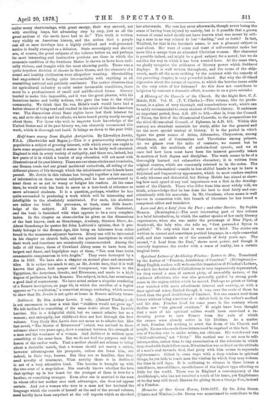Salt hurst. By Mrs. Arthur Lewis. 2 vols. (Samuel Tinsley.)—It
is not uncommon to hear a wish that "children Would not grow up." We felt inclined to something of tho same desire about Mrs. Lewis's heroine. She is a delightful child, but we cannot admire her as a woman ; and unhappily, her childhood does not last through the first volume. Very likely Mrs. Lewis does not mean us to admire her. Her last novel, "The Master of Riverswood " (which was noticed in these columns about two years ago), drew a contrast between the strength of a man and the weakness of a woman. And Salthurst is written upon something of the same lines. But we do not find the purpose and the lesson of the earlier work. That a mother should not scheme to bring about a desirable match, that a woman should not marry a suitor, however advantageous his prospects, unless she loves him, are indeed, in their way, lessons. But they are so familiar, that they need novelty of treatment. What novelty there is in Salthmst is not of a very attractive kind. The heroine is brought up with the two sons of a step-father. She scarcely knows whether the love that springs up in her heart for the younger of them is love for a brother, or something stronger. Even after she is married to the man in whose offer her mother sees such advantages, she does not appear certain. And yet a woman who uses to a man not her husband the language which she records of herself at the end of the second volume, need hardly have been surprised at the evil reports which so shocked her afterwards. She sees her error afterwards, though never losing the sense of having been injured by society, but is it possible that a grown woman of sound mind should not have known what was meant by call- ing a man in no way related to her darling," and so forth? In fact, Winifred, for that is the heroine's name, is not a pleasant subject to read about. Her want of sense and want of self-restraint make her more like a savage than an educated Christian woman. Her character is possible indeed, and might be a good subject for a novel; but we do netlike the way in which it has been treated here. At the same time, we gladly recognise the evidences of literary power which Salthurst displays. It is well written throughout, and the scene of the ship-.
wreck, made all the more striking by the contrast with the comedy of the preceding chapter, is very powerful indeed. But why the ill-timed digression about the nature of curates, to which the heroine turns aside in the very crisis of her fortunes ? As this does not contribute to heighten by contrast a dramatic effect, it seems to us a pure mistake.


































 Previous page
Previous page